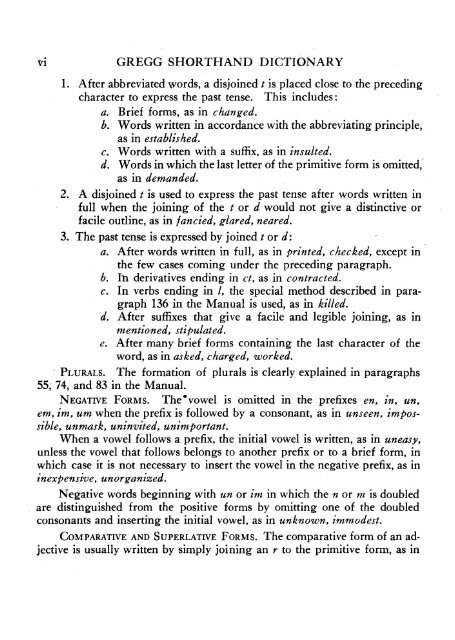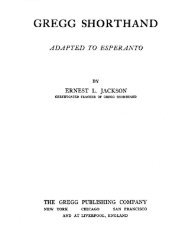GREGG SHORTHAND DICTIONARY
GREGG SHORTHAND DICTIONARY
GREGG SHORTHAND DICTIONARY
Create successful ePaper yourself
Turn your PDF publications into a flip-book with our unique Google optimized e-Paper software.
vi <strong>GREGG</strong> <strong>SHORTHAND</strong> <strong>DICTIONARY</strong><br />
1. After abbreviated words, a disjoined t is placed close to the preceding<br />
character to express the past tense. This includes:<br />
a. Brief forms, as in changed.<br />
b. Words written in accordance with the abbreviating principle,<br />
as in established.<br />
c. Words written with a suffix, as in insulted.<br />
d. Words in which the last letter of the primitive form is omitted:<br />
as in demanded.<br />
2. A disjoined t is used to express the past tense after words written in<br />
full when the joining of the t or d would not give a distinctive or<br />
facile outline, as in fancied, glared, neared.<br />
3. The past tense is expressed by joined t or d:<br />
a. After words written in full, as in printed, checked, except in<br />
the few cases coming under the preceding paragraph.<br />
b. Ih derivatives ending in ct, as in contracted.<br />
c. In verbs ending in I, the special method described in paragraph<br />
136 in the Manual is used, as in killed.<br />
d. After suffixes that give a facile and legible joining, as in<br />
mentioned. stipulated.<br />
e. After many brief forms containing the last character of the<br />
word. as in asked. charged. worked.<br />
PLURALS. The formation of plurals is clearly explained in paragraphs<br />
55, 74, and 83 in the Manual.<br />
NEGATIVE FORMS. The·vowel is omitted in the prefixes en. in. un.<br />
em. im. um when the prefix is followed by a consonant, as in unseen. impossible,<br />
unmask, uninvited. unimportant.<br />
When a vowel follows a prefix, the initial vowel is written, as in uneasy,<br />
unless the vowel that follows belongs to another prefix or to a brief form, in<br />
which case it is not necessary to insert the vowel in the negative prefix, as in<br />
inexpensive. unorganized.<br />
Negative words beginning with un or im in which the n or m is doubled<br />
are distinguished from the positive forms by omitting one of the doubled<br />
consonants and inserting the initial vowel, as in unknown. immodest.<br />
COMPARATIVE AND SUPERLATIVE FORMS. The comparative form of an adjective<br />
is usually written by simply joining an r to the primitive form, as in



